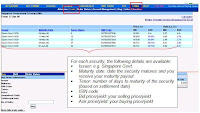Credit card debt in Singapore ballooningTaken from The Straits Times, 27th Feb 2009
SINGAPORE, Feb 26 — Credit card debt in Singapore hit an estimated S$3.4 billion (RM8.2 billion) last December, the highest for that month in 20 years. More people have also sought help in settling their outstanding bills.
Going by figures from the Monetary Authority of Singapore, the number of credit cards rose 11 per cent in the last year, but rollover balances jumped more than 13 per cent.
Rollover balances, which are the unpaid amounts that are subject to interest charges, have been climbing steadily since 2006.
Also up: The proportion of card holders with bills unpaid 30 days past the due date. It rose from 1.38 per cent last July to 1.67 per cent in December.
All this has made for a busier time for Credit Counselling Singapore (CCS), a non-profit organisation which helps debtors work out instalment plans to pay off their debts.
It said it handled a third more cases in the second half of last year than in the first half — 415 counselling appointments in the second half of the year, up from 299 in the first half.
Talks on credit management organised by CCS also started drawing bigger audiences — 1,254 in the second half of the year, against 929 in the first half.
Who is the typical debtor? That person is likely to be male and aged between 35 and 44, said the Credit Bureau (Singapore), which collects credit-related information and supplies this to credit providers such as banks.
The profile pieced together by the bureau is of a person likely to have defaulted on bill payments and, as a result, has had a credit account with an outstanding balance closed in the last six months.
CCS assistant director Tan Huey Min cited some possible reasons for the rise in number of debtors seeking help.
One of these is increased awareness that such programmes are available. Another is that the banks may be turning up the heat on debtors and making people “realise that they need to do something”.
She added: “Debtors or their family members may also be affected by job losses, so cash flow may have become a problem.”
A CCS client, Susan Ng, said she was already on a debt repayment plan when she lost her job late last year. The 30-year-old, who was an accounts manager, returned to CCS for help in deferring her repayments. She still owes four banks S$60,000.
The CCS secured for her deferments on her repayments till the end of this month, but she may need more time as she is still jobless. She said that if an extension is not possible, she will have to declare herself a bankrupt “as a last resort”.
CCS president Kuo How Nam said that the spike in card spending last December to a new high of S$2.438 billion “could translate into higher rollover debt over the next couple of months”.
Lim Cheng Boon, CCS' head counsellor, said the easy availability of credit puts people in a “state of denial” — even among those who know they are spending more than they should.
He said of the high earners used to a lavish lifestyle: “When their income changes, for example, when they take a pay cut, they are not prepared to make the changes in their lifestyle, and hope the situation will improve — which rarely happens.”
I'm not really a fan of credit cards if you ask me. So far, I have been using debit cards and there are a couple of reasons why I do so. First of all, I prefer to spend only on what I have. If I have $100, than I will just spend this $100. Period. Besides this, I don't like the feeling of owing money to the bank but I guess this is personal. The most important reason is that the interest rate that banks charge on unpaid credit card bills can easily hit 20% per annum and that is simply exorbitant. If you can achieve a 20% per annum gains on your investment, you can double your capital in around 3.5 years time and a 20% return yearly is considered to be very respectable already. If the interest rate that bank charge on unpaid credit card bills is around 5%, I actually don't mind using it.
However, credit cards are not necessarily evil as the most important factor is the person who will be using the credit card. If one can discipline himself by paying off his credit card bills in timely, it is not an issue actually.









 . Do bear in mind that the minimum amount of units for purchase is 1000 units.
. Do bear in mind that the minimum amount of units for purchase is 1000 units.














